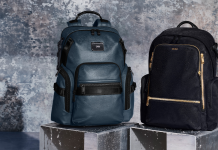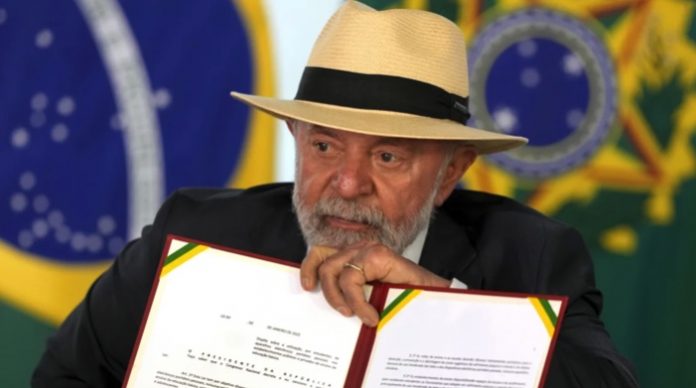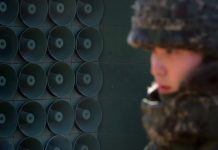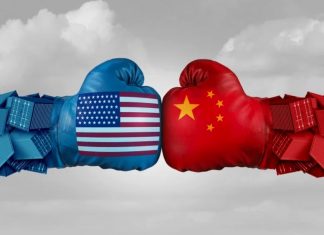ประธานาธิบดีลูอิซ อินาซิโอ ลูลา ดา ซิลวา ของบราซิล ลงนามในกฎหมายเมื่อวันจันทร์ที่จำกัดการใช้สมาร์ทโฟนในโรงเรียน ตามแนวโน้มทั่วโลกที่มีการกำหนดข้อจำกัดดังกล่าว
มาตรการนี้จะส่งผลกระทบต่อนักเรียนในโรงเรียนระดับประถมศึกษาและมัธยมศึกษาทั่วประเทศในอเมริกาใต้ เริ่มตั้งแต่เดือนกุมภาพันธ์ กฎหมายดังกล่าวจัดทำกรอบกฎหมายเพื่อให้มั่นใจว่านักเรียนจะใช้สมาร์ทโฟนเฉพาะในกรณีฉุกเฉินและอันตราย สำหรับการศึกษา หรือสำหรับนักเรียนที่มีความพิการและจำเป็นต้องใช้เท่านั้น
คามิโล ซานตานา รัฐมนตรีว่าการกระทรวงศึกษาธิการกล่าวกับผู้สื่อข่าวในกรุงบราซิเลียเมื่อวันจันทร์ว่า เด็กในปัจจุบันเริ่มใช้อินเทอร์เน็ตตั้งแต่อายุยังน้อย ทำให้ผู้ปกครองติดตามพฤติกรรมได้ยากขึ้น และการจำกัดการใช้สมาร์ทโฟนในโรงเรียนจะช่วยแก้ปัญหานี้
“เราต้องการให้สมาร์ทโฟนถูกใช้ในห้องเรียนเพื่อวัตถุประสงค์ทางการศึกษา และอยู่ภายใต้คำแนะนำของครู เช่นเดียวกับในอีกหลายประเทศ” ซานตานากล่าว
กฎหมายฉบับนี้ได้รับการสนับสนุนอย่างกว้างขวางจากหลากหลายฝ่ายทางการเมือง ทั้งพันธมิตรของลูลาและฝ่ายตรงข้ามจากอดีตประธานาธิบดี ไจร์ โบลโซนาโร
ผู้ปกครองและนักเรียนจำนวนมากก็เห็นด้วยกับมาตรการนี้ ผลสำรวจที่เผยแพร่ในเดือนตุลาคมโดย Datafolha ผู้สำรวจความคิดเห็นในบราซิลระบุว่า เกือบสองในสามของผู้ตอบแบบสอบถามสนับสนุนการห้ามใช้สมาร์ทโฟนโดยเด็กและวัยรุ่นในโรงเรียน และกว่า 75% เชื่อว่าสมาร์ทโฟนสร้างผลเสียมากกว่าผลดีต่อเด็กของพวกเขา
ริคาร์โด มาร์ตินส์ รามอส อายุ 43 ปี พ่อของลูกสาวสองคนและเจ้าของร้านเบอร์เกอร์ในรีโอเดจาเนโรกล่าวว่า “การจำกัดการใช้โทรศัพท์มือถือเป็นเรื่องยาก แต่จำเป็น มันมีประโยชน์สำหรับการค้นคว้าข้อมูลในโรงเรียน แต่การใช้เพื่อสังคมนั้นไม่ดี เด็กๆ จะได้มีปฏิสัมพันธ์กันมากขึ้น”
อิซาเบลา ลูกสาววัย 13 ปีของเขา กล่าวว่า เพื่อนร่วมชั้นของเธอมีปัญหาในการมีสมาธิในชั้นเรียนเพราะสมาร์ทโฟน เธอเห็นด้วยกับมาตรการนี้ แต่เชื่อว่ายังไม่เพียงพอที่จะปรับปรุงสภาพแวดล้อมการเรียนรู้
“เวลาครูให้ใช้โทรศัพท์มือถือ ก็เพราะครูต้องการให้ค้นหาข้อมูล” เธอกล่าว “ยังมีอีกหลายปัญหาที่โรงเรียนแก้ไม่ได้ เช่น การกลั่นแกล้งและการล่วงละเมิด”
ณ ปี 2023 มีโรงเรียนประมาณสองในสามในบราซิลที่กำหนดข้อจำกัดในการใช้โทรศัพท์มือถือ ขณะที่ 28% ของโรงเรียนห้ามใช้โทรศัพท์โดยสิ้นเชิง ตามผลสำรวจที่เผยแพร่ในเดือนสิงหาคมโดยคณะกรรมการบริหารอินเทอร์เน็ตแห่งบราซิล
รัฐริโอเดจาเนโร มารันเยา และโกยาสในบราซิลได้ผ่านกฎหมายท้องถิ่นเพื่อห้ามใช้โทรศัพท์มือถือในโรงเรียนแล้ว แต่เจ้าหน้าที่กลับพบปัญหาในการบังคับใช้กฎหมายดังกล่าว
ทางการในรัฐเซาเปาโล ซึ่งเป็นรัฐที่มีประชากรมากที่สุดในบราซิล กำลังหารือเกี่ยวกับการห้ามใช้สมาร์ทโฟนทั้งในโรงเรียนรัฐและเอกชน
กาเบรียล อเล็กซานดรา เอนริเกส พินเฮโร อายุ 25 ปี ทำงานในร้านเสริมสวยและเป็นแม่ของลูกชายที่มีภาวะออทิสติก เธอก็เห็นด้วยกับมาตรการจำกัดนี้ แต่เชื่อว่าผู้ใหญ่ยังคงเป็นตัวอย่างที่ไม่ดีในการใช้สมาร์ทโฟนให้กับเด็กๆ
“มันยาก” เธอกล่าว “ฉันพยายามจำกัดเวลาที่ลูกดูหน้าจอ แต่เมื่อฉันมีงานที่ต้องทำ ฉันก็ต้องใช้สมาร์ทโฟนเพื่อทำงานเหล่านั้นให้เสร็จ”
ตลอดหลายปีที่ผ่านมา สถาบัน รัฐบาล ผู้ปกครอง และคนอื่นๆ ได้เชื่อมโยงการใช้สมาร์ทโฟนในเด็กกับปัญหาการกลั่นแกล้ง ความคิดฆ่าตัวตาย ความวิตกกังวล และการเสียสมาธิที่จำเป็นต่อการเรียนรู้
จีนได้ออกมาตรการจำกัดการใช้สมาร์ทโฟนของเด็กเมื่อปีที่แล้ว ในขณะที่ฝรั่งเศสมีกฎหมายห้ามใช้สมาร์ทโฟนในโรงเรียนสำหรับเด็กอายุ 6-15 ปี
การห้ามใช้โทรศัพท์มือถือเริ่มได้รับความนิยมในสหรัฐฯ โดยมี 8 รัฐที่ออกกฎหมายหรือกำหนดนโยบายห้ามหรือจำกัดการใช้โทรศัพท์มือถือเพื่อลดการเข้าถึงโทรศัพท์ของนักเรียนและลดสิ่งรบกวนในห้องเรียน
ผู้ปกครองในยุโรปจำนวนมากขึ้นแสดงความกังวลต่อหลักฐานที่แสดงว่าการใช้สมาร์ทโฟนในเด็กเล็กทำให้พวกเขาเสี่ยงต่อปัญหาด้านความปลอดภัยและสุขภาพจิต
รายงานที่ตีพิมพ์ในเดือนกันยายนโดยยูเนสโก องค์การการศึกษา วิทยาศาสตร์ และวัฒนธรรมแห่งสหประชาชาติ ระบุว่า 1 ใน 4 ประเทศได้จำกัดการใช้สมาร์ทโฟนในโรงเรียนแล้ว
ปีที่แล้ว ในการพิจารณาของวุฒิสภาสหรัฐฯ ซีอีโอของ Meta มาร์ก ซักเคอร์เบิร์ก ได้ขอโทษผู้ปกครองของเด็กที่ถูกแสวงหาประโยชน์ ถูกกลั่นแกล้ง หรือถูกผลักดันให้ทำร้ายตัวเองผ่านโซเชียลมีเดีย และยังระบุถึงการลงทุนของ Meta ในความพยายามระดับอุตสาหกรรมเพื่อปกป้องเด็กๆ ต่อไป
Brazil restricts use of smartphones in elementary and high schools
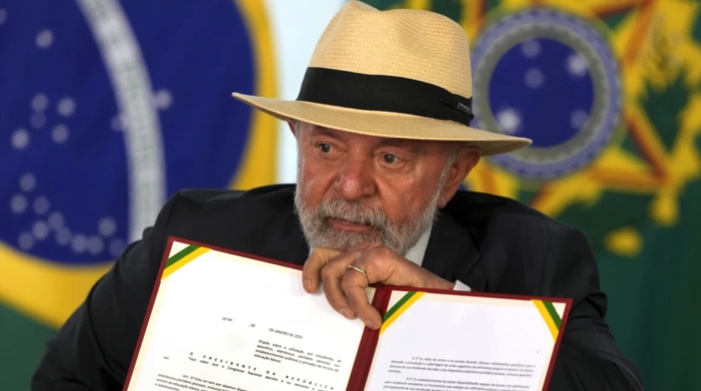
AP —
Brazil’s President Luiz Inácio Lula da Silva on Monday signed a bill restricting the use of smartphones at school, following a global trend for such limitations.
The move will impact students at elementary and high schools across the South American nation starting in February. It provides a legal framework to ensure students only use such devices in cases of emergency and danger, for educational purposes, or if they have disabilities and require them.
Education minister Camilo Santana told journalists in the capital Brasilia on Monday that children are going online at early ages, making it harder for parents to keep track of what they do, and that restricting smartphones at school will help them.
“We want those devices, as in many other countries, to only be used in class for pedagogical purposes and with a teacher’s guidance,” Santana said.
The bill had rare support across the political spectrum, both from allies of leftist Lula and his far-right foe, former President Jair Bolsonaro.
Many parents and students also approved the move. A survey released in October by Brazilian pollster Datafolha said that almost two-thirds of respondents supported banning the use of smartphones by children and teenagers at schools. More than three-quarters said those devices do more harm than good to their children.
“(Restricting cell phones) is tough, but necessary. It is useful for them to do searches for school, but to use it socially isn’t good,” said Ricardo Martins Ramos, 43, father of two girls and the owner of a hamburger restaurant in Rio de Janeiro. “Kids will interact more.”
His 13-year-old daughter Isabela said her classmates struggled to focus during class because of their smartphones. She approved the move, but doesn’t see it as enough to improve the learning environment for everyone.
“When the teacher lets you use the cell phone, it is because he wants you to do searches,” she said. “There’s still a lot of things that schools can’t solve, such as bullying and harassment.”
As of 2023, about two-thirds of Brazilian schools imposed some restriction on cellphone use, while 28% banned them entirely, according to a survey released in August by the Brazilian Internet Steering Committee.
The Brazilian states of Rio de Janeiro, Maranhao and Goias have already passed local bills to ban such devices at schools. However, authorities have struggled to enforce these laws.
Authorities in Sao Paulo, the most populous state in Brazil, are discussing whether smartphones should be banned both in public and private schools.
Gabriele Alexandra Henriques Pinheiro, 25, works at a beauty parlor and is the mother of a boy diagnosed with autism spectrum disorder. She also agrees with the restrictions, but says adults will continue to be as a bad example of smartphone use for children.
“It is tough,” she said. “I try to restrict the time my son watches any screens, but whenever I have a task to perform I have to use the smartphone to be able to do it all,” she said.
Institutions, governments, parents and others have for years associated smartphone use by children with bullying, suicidal ideation, anxiety and loss of concentration necessary for learning. China moved last year to limit children’s use of smartphones, while France has in place a ban on smartphones in schools for kids aged six to 15.
Cell phone bans have gained traction across the United States, where eight states have passed laws or policies that ban or restrict cellphone use to try to curb student phone access and minimize distractions in classrooms.
An increasing number of parents across Europe who are concerned by evidence that smartphone use among young kids jeopardizes their safety and mental health.
A report published in September by UNESCO, the United Nations Educational, Scientific and Cultural Organization, said one in four countries has already restricted the use of such devices at schools.
Last year in a US Senate hearing, Meta CEO Mark Zuckerberg apologized to parents of children exploited, bullied or driven to self harm via social media. He also noted Meta’s continued investments in “industrywide” efforts to protect children.
By Associated Press, CNN





